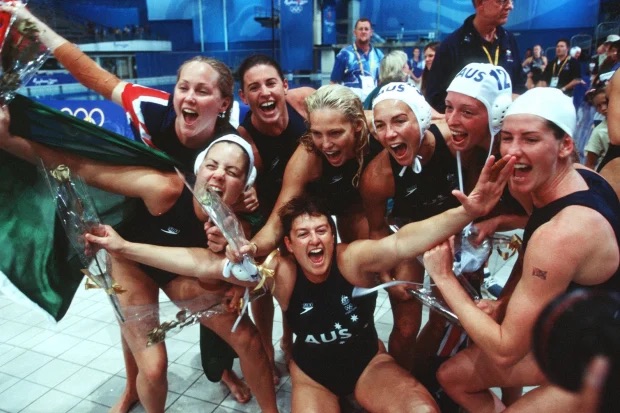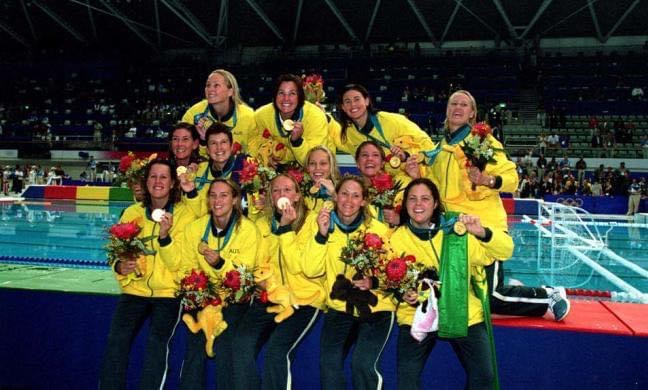Inspired by an encounter with a physiotherapist for her own injury as a teenager, Danielle Woodhouse changed her mind about becoming a veterinarian, and became a physio instead.
Then, while still pursuing her professional vocation, she became an elite water polo player, which eventually led to a gold medal at the 2000 Sydney Olympic Games.
Her experience of treating injuries over the years, and her lived experience of having numerous sports related injuries, give Danielle a unique perspective — one that’s highly beneficial for her patients.
We spoke to her about her amazing career, and of course, her incredible Olympic experience.

We’re interested in Danielle’s physio expertise, but first, let’s talk about that gold medal!
We had scored the winning goal with less than a second remaining and weren’t sure whether it had been allowed so there was a lot of confusion. Everything from there was a blur for quite some time. Overall, it was a surreal experience – even looking back on it 24 years later!
The Olympic experience is like no other and it is not easily explained. It is the stuff dreams are made of – every kid dreams of standing on the podium, meeting their sporting idols and competing against the best in the world
Competing at that level is a 100% life commitment, 24 hours a day. Continuing to work in a physical profession as a physio whilst full time training in an amateur sport was also difficult and dealing with injuries (of which I had many) was also challenging.
I’ve had great opportunities working with water polo athletes at the highest level and within the water polo and Australian sporting communities. The gold medal is the gift that keeps on giving as I have had great opportunities personally and professionally as a result. My personal lived experiences have also helped to make me a better physio as I deeply understand how an injury can physically and mentally affect a person.
From teenage patient to skilled physiotherapist
I became a physio because of my own experience as a patient when I experienced a knee injury in year 12. I had always wanted to be a vet but changed my mind after that.
I was already a physio and had been working for several years when I first made the Australian Team. Working in private practice allowed me to modify hours and days etc to suit training times. In 1997 I did my Masters in Sports Physiotherapy, and it was that year that we found out the women’s water polo would be included at the Olympics for the first time.
Six months out from the Olympics we relocated to the Sunshine Coast so left our jobs and families behind. I ended up getting a little bit bored so took on a few hours at the local practice where our team was being looked after. Our Olympic team physiotherapist Andrea Mosler was a great mentor for me (as well as an amazing clinician) and ignited my passion to work with elite athletes.
As a clinician I can look at things from an athlete’s perspective as well as a physio perspective. Over my career I have had personal experience with many injuries that I see today, and nothing gives a patient more confidence than when you tell them you’ve had that same injury!
I’ve always enjoyed working with shoulders and that has brought me to my current position with Southcare Lifecare where I provide pre and post operative rehabilitation services for Prof Allan Wang, shoulder and upper limb surgeon.
Advance shoulder management initiative
I’ve been working with Professor Wang for nearly 4 years, looking after the pre and post operative rehabilitation of his patients. If there are patients he believes are not necessarily surgical candidates, he’ll also refer them for physiotherapy management.
Generally, there is a time lag between injury and the institution of appropriate management. A patient will see their GP, have some investigations, possibly a trial of conservative management, medication and/or corticosteroid injection and only after all of that is then referred to the surgeon. The advance shoulder management initiative allows patients to be seen early, triaged by experts with an appropriate management plan immediately put in place — whether it be conservative physiotherapy management, or immediate referral for surgical review. The time saved with this approach will result in significant savings for Insurers and a quicker return to work for patients.
The collegial approach that we have in conjunction with Professor Wang is very fulfilling, as our knowledge and expertise as physios is respected and utilised. He is one of the first surgeons to routinely use prp (platelet rich plasma) in rotator cuff repairs which has improved patient outcomes with regards to pain levels post operatively and reduced length of time in a sling.
Prof Wang continues to seek to improve patient outcomes, in appropriate surgical cases using innovative technologies such as collagen patches, tendon allografts, and tenocyte implantation along with stemless ceramic shoulder replacements. Along with solid post operative rehabilitation protocols developed over many years for rotator cuff repairs and shoulder joint replacement this gives us the opportunity to further develop our rehabilitation protocols in conjunction with this and keep pace with improved techniques and technologies.
As an example, when I graduated as a physiotherapist, shoulder replacements were not yet a mainstream option. With Prof Wang we now see approximately 100 anatomical, reverse and ceramic stemless shoulder replacements a year and the outcomes for patients are life changing. I really enjoy being part of the team that can help to deliver this to patients.
Post-surgery shoulder treatment and rehabilitation
Post operatively we see mainly rotator cuff repairs, shoulder replacements and stabilisation procedures. Prof Wang is meticulous with his techniques, and we see great post operative outcomes. Prof Wang runs a very integrated practice with a great deal of physiotherapy input, and we work in a collegial manner.
With water polo athletes we see impingement issues with occasional labral injuries. My aim with these athletes is to ensure that we manage them conservatively where possible and appropriately overall to maximise their performance but also their long-term body health. I am a big fan of ‘prehab’ versus rehab, and with many of the surgical clients we see, I believe that with more modern management methods earlier they may have avoided surgery.
Advice for athletes dealing with shoulder injuries
See a physio who specialises in shoulders and understands the specific demands of your sport as well as the high level of sport specific rehabilitation that is needed. A physio with a good network around them will maximise your recovery and can refer on appropriately if required.

For more information about physiotherapy and shoulder injury management, see your local Lifecare physiotherapist or contact us here.

